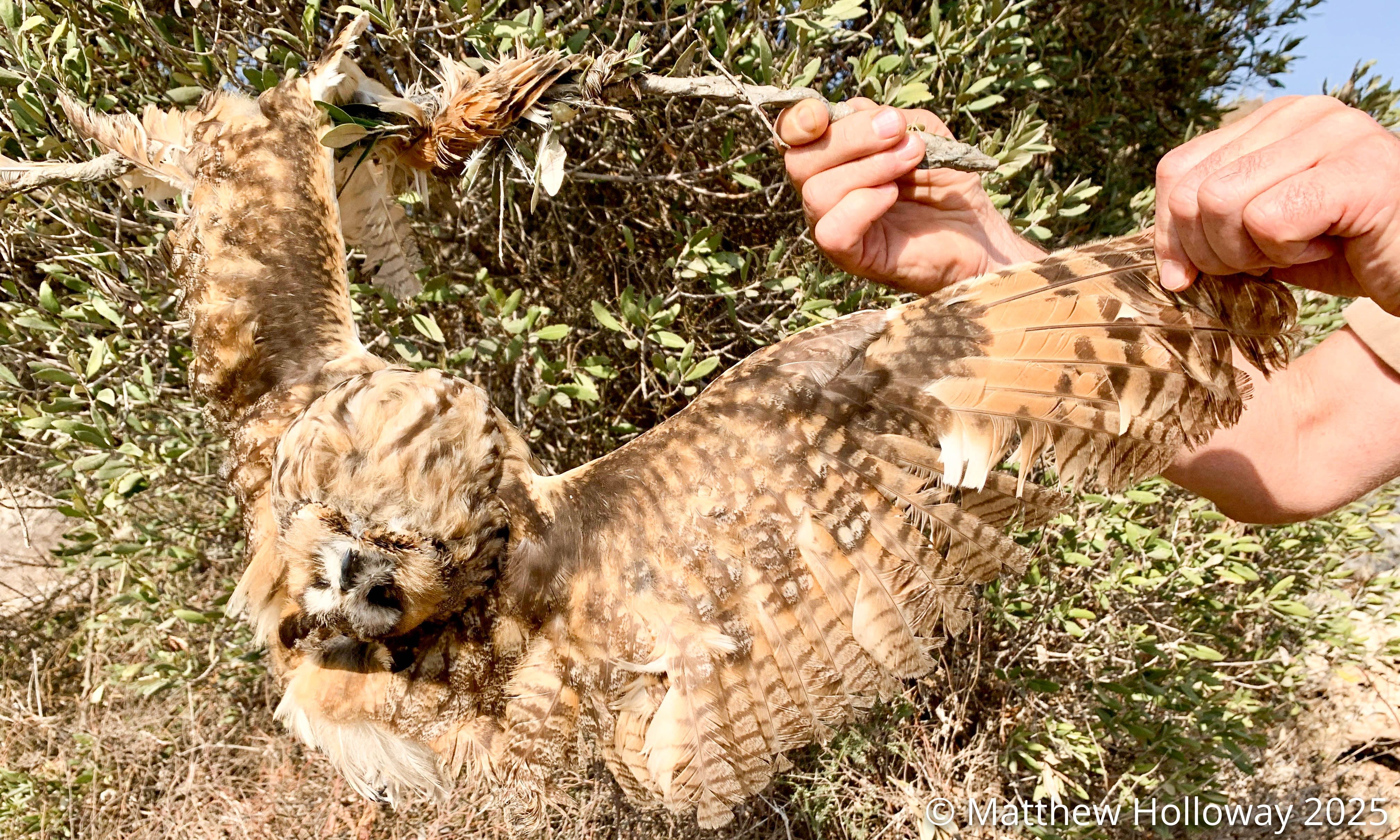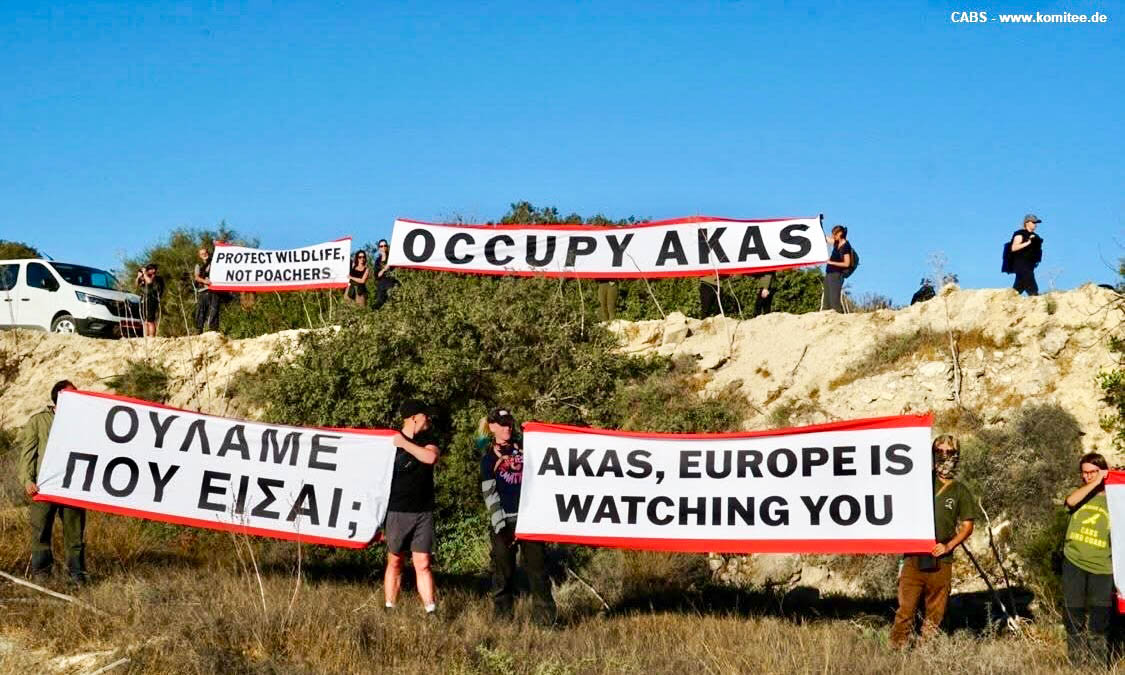Despite progress over recent years in reducing the trapping of songbirds in Cyprus – a practice illegal since 1974 under Cypriot law and then later also under EU legislation – scientific data shows this brutal activity is once again on the rise.
Alarmingly, this resurgence has been accompanied by increasing reports of intimidation, threats, violence and destruction of property against not only peaceful environmental activists simply asking for existing laws to be enforced, but also uninvolved birdwatchers, academic researchers, tourists and others simply enjoying nature, with law enforcement largely failing to intervene, investigate or enforce the law.
Last week, UK journalists Chris Packham and Megan McCubbin, alongside international volunteers from CABS (the Committee Against Bird Slaughter) and concerned Cypriots protested against a major trapper in the Larnaca district known as “Akas”, who evidence collected over many years shows has, along with other individuals, been involved in the killing of thousands of birds annually for personal profit.
He was quoted as saying “I don’t care for you, I don’t care for [other countries], I don’t care for Cyprus, I just care for myself”. This is a clear indication that despite the common rhetoric from the pro-trapping lobby that those involved in trapping are simply continuing a harmless tradition because they care deeply about Cyprus and its culture, this is simply not the case and in reality, those involved in trapping in Cyprus are often greedy, selfish criminals who simply do not care about their own country and the vast environmental and economic damage this unnecessary practice is causing both in and outside of Cyprus.
Video evidence was again gathered showing crimes being committed, and while law enforcement has known about this operation for over a decade and are regularly informed of the illegal activity at the site, they have repeatedly failed to enforce the law which has led many to express concerns over potential police and government complicity and the feeling that the lack of action is, at best, due to incompetence, and at worse to blatant corruption.

Protesters faced verbal and physical abuse, online threats and received little support from the police or courts. However, CABS were able to raise over €30,000 entirely from donations made by those both in Cyprus and internationally who are outraged about the lack of action from Cypriot law enforcement and government in effectively tackling this issue, and CABS have pledged to continue working towards the goal of ending bird trapping in Cyprus in alignment with Cypriot and EU law.
The police then released a statement on Friday confirming a site in the Larnaca district had been visited, trapping materials confiscated, over 300 live birds released and over 50 found dead. However, no information has been given regarding if any arrests were made or prosecutions achieved, or if this action was related to the protests.
Earlier this year, a University of Cyprus research team studying the endemic Cyprus Warbler in order to better understand and protect the species was attacked by a man claiming to be a retired police officer. With no knowledge of what was taking place and no interest in learning, the man accused the team of harming birds, then damaged equipment and verbally and physically assaulted a professor – despite all research permits being valid.
In a separate incident last week, birdwatchers at Achna Dam were threatened by masked individuals in unmarked vehicles and told to leave public land or face violence. This is not the first time this has happened and was again reported, yet again no action was taken.
The pattern we have seen over the years in Cyprus of initial progress in combatting the issue followed by relapse is predictable and has previously occurred. When pressure is applied – from NGOs, foreign governments and activists – authorities respond, prosecutions rise and trapping decreases. But once some progress is visible, law enforcement eases up, anti-poaching units are disbanded and knowledge gained on how to combat this issue on the ground is lost.
The cycle then repeats.
This reactionary approach fails in the long term and without consistent enforcement and proactive deterrence, numbers of birds killed in Cyprus return to previous levels – hundreds of thousands if not millions annually.
Meanwhile, activists face increasing hostility and trappers use intimidation and violence, while enjoying near-total impunity in their criminal activities. Activists are regularly assaulted and their property stolen or damaged, and some have even had explosive devices planted on their vehicles.
For Cypriots, direct action is not easy. Due to the island’s small size and close-knit communities, anonymity is next to impossible. Local activists face retaliation, social pressure and sometimes physical danger. Police officers hesitate to intervene, especially if the perpetrators are relatives, friends, or politically connected and corruption appears rampant with particularly larger-scale trappers, some allegedly involved in organised crime, remaining untouched.
A prominent politician has even boasted publicly that he eats ambelopoulia (a catch-all term for various preparations of songbirds) and paid for the education of his children through illegal trapping profits. Courts and police regularly let offenders go or reduce fines and sentences, and enforcement in the field is unreliable at best.

As bird trapping rises again, so does activism – and so too does opposition to it. Some hunters, many trappers, and those aligned with them push to make trapping legal again, often cloaking it in arguments about “tradition” or “culture.” Many are linked to powerful pro-hunting groups with political influence and mix other positive policies with the idea that bird trapping is acceptable in attempts to justify the practice.
In 2025, the government reversed environmental protections to allow hunting dog training in protected Natura 2000 sites during breeding season in direct violation of not only Cypriot, but also EU law. Again in 2025, major roads were blocked by hunting groups demanding even more rights which inconvenienced thousands, caused delays to emergency services and resulted in no legal action by the police or government.
Right-wing, nationalist and anti-immigrant ideologies are now being used to portray foreign activists as “unwelcome outsiders” meddling with Cypriot culture. This fuels hostility and creates a dangerous political atmosphere leading into the 2026 elections, where some politicians are already using pro-trapping and xenophobic rhetoric to gain votes with some proposing that environmental activists be banned from entering Cyprus altogether.
This further reenforces the mindset that to be aligned with certain political views including any form of Cypriot national pride, one must also oppose not only environmental activism but any form of discussion on progressive environmental policy. This is simply not the case – Cypriots can of course be proud of their country, it’s unique traditions and culture and practice sound environmental policy which provides a better world for both humans and nature.
One argument made in favour of trapping is that many birds killed are from elsewhere and just passing through, so don’t influence the environment in Cyprus. These species are however just as essential to healthy ecosystems as resident species – they pollinate crops, disperse seeds, and control pests.
Over 150 species have been recorded as killed by traps in Cyprus, including water birds, owls and even non-bird species like chameleons, snakes, hedgehogs and cats. Many birds present in Cyprus travel to other countries where they are not killed and are important culturally, to agriculture and to the wider economy, and this is a reason why foreign activists visit Cyprus – they want to prevent these birds being killed here leading to the loss of these species and the resulting issues this causes in their native countries.
Another pro-trapping argument is that this is a traditional practice. Historically, yes – but that was during times of food scarcity, fewer people, less intensive trapping methods and much higher bird numbers. Today, this justification no longer holds. Cyprus has stable food systems and continuing this practice for profit or taste is unjustifiable, serving only to damage the environment, empower criminals and make an enemy of our own futures.
To support trapping operations, trappers often clear native habitats and replace them with species such as invasive acacia (from Australia) to make trapping easier. This leads to erosion, soil degradation, loss of food sources and nesting sites for a wide range of life, biodiversity collapse, and long-term environmental harm which had been shown to affect both wildlife and humans negatively.
Cyprus is internationally recognised for its high-quality agricultural products and these depend on a functioning ecosystem. Birds are vital to the survival of agriculture and thus human life, and their loss impacts everything from food production to water quality.
It is crucial to recognise that the power to enact positive change lies with individuals and communities throughout Cyprus. There can be no stronger voice than that of the Cypriot people coming together to demand the enforcement of existing laws and the protection of the unique species and ecosystems found nowhere else in the world. We can do this in many ways:
- Education is key – understanding why biodiversity and ecological balance are essential, and why Cyprus is unique;
- Speak out – take direct action, contact elected officials, religious leaders, and law enforcement to demand the protection of the natural heritage of Cyprus, enforcement of the law and adoption of effective environmental policy;
- Support NGOs – both local and international – who are working on this issue despite limited resources and who can often provide information, advice and support;
- Reject misinformation – culture and tradition is not an excuse to harm the environment, those who seek to understand nature and the environment are not the enemy.
The illegal trapping of song birds is not just a wildlife issue. It is a symptom of broader systemic problems: corruption, weak governance, social intimidation, and a lack of education relating to ecology and the environment. Yet, it is also a battle that can be won. Cyprus once led the region in banning this practice – now it must lead again in truly ending it by enforcing these laws.
By protecting its birds, Cyprus protects its environment, its people, and its future.






Click here to change your cookie preferences